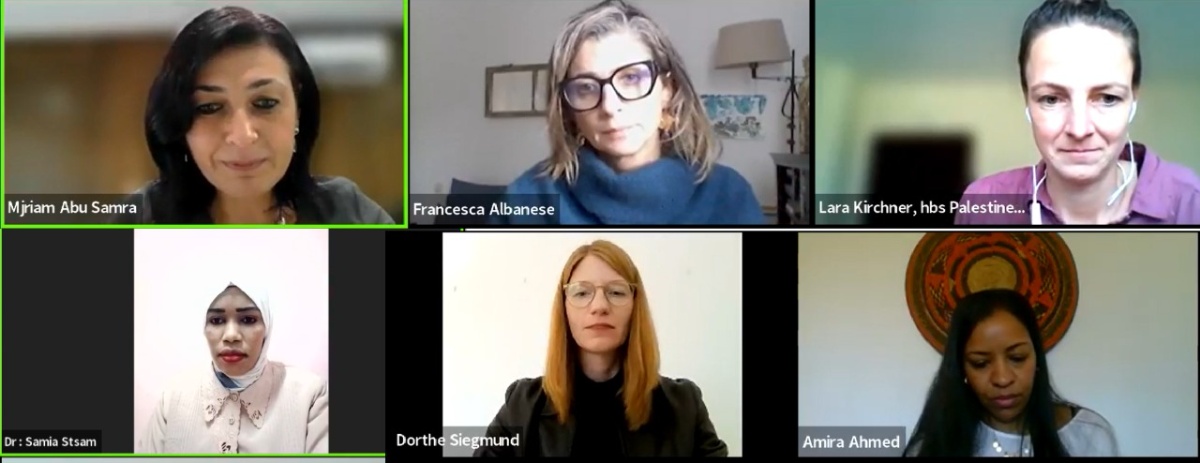ARDD, in cooperation with Heinrich-Boll Stiftung foundation (HBS) Palestine and Jordan, held a webinar on November 9, 2022, discussing “lessons learned and the way forward” in the efforts to protect migrant workers and refugees in Jordan, within the framework of ARDD’s Haquna project. The project, funded by HBS Palestine and Jordan used a bottom-up approach to advocate for migrant workers and refugees’ rights; it led to the establishment of the first Migrant Workers Committee (MWC) in Jordan.
The webinar was moderated by Al Nahda Center Senior Research officer at ARDD, PhD. Mariam Abu Samra; main speakers were ARDD Senior Advisor on Migration, Forced Displacement and Statelessness Francesca Albanese, member of the Migrant Workers Committee PhD. Samia Adam, founding member of the MARFA network and Assistant Professor and Associate Researcher at the American University in Cairo PhD. Amira Ahmed, and Professor at the Department of Social Work of the German Jordanian University PhD. Sahar Al-Makhamreh.
Abu Samra said that the webinar offers an opportunity to see what bottom-up strategies can still be devised, based on the lessons learned from the implementation of the Haquna project. According to her, “it is important to continue talking about the conditions of refugees in the Arab World and beyond, and to try to plan strategies that can actually give voice to vulnerable populations who need protection, access to services and better living conditions.”
Director of HBS Palestine and Jordan Dorthe Siegmund said that a central outcome of the Haquna project was ARDD’s establishing the migrant workers committee, which is an important platform for migrant workers to get directly engaged in advocating for their rights, and to enhance awareness about their legal rights, especially among those without social protection. Siegmund said the committee helps create a network of support for the migrant workers and refugees’ communities at large; it is an inclusive committee, composed of 32 migrant workers of nine different nationalities, and with a 57% female representation to ensure that women’s voices are heard and included in any dialogue.
Albanese presented the core principles and vision that inspired the Haquna approach, stressing the importance of not only guaranteeing protection and improving the living conditions of migrants and refugees in host countries but also of being made aware of, and eliminating, the different forms of discrimination they face at legal, social, and economic levels.
ARDD adopted an approach that puts migrant workers and refugees at the center of strategies that ensures their protection and relied on their voices and input in drafting policy recommendations and conducting research. According to Albanese, “ARDD’s approach can be replicated elsewhere”
Albanese also introduced the four policy memos that were produced as part of the Haquna project, emphasizing that they combine the central contribution of MWC members with evidence from sectorial studies and analyses conducted by ARDD to offer specific assessment and policy strategies that address: (1) Migrant workers’ and refugees’ access to legal aid; (2) Labor rights framework; (3) Access to basic services; (4) Durable solutions for migrant workers and refugees, thus putting forward a set of actionable recommendations to enhance the protection of refugees and migrant workers.
Adam presented the goals and ambitions of the MWC. She said that the committee’s main goal was to reach a large number of migrants and refugees and raise their awareness about their legal status and the legal tools at their disposal that may help them improve their living conditions, be aware of and comply with national laws, toward more social cohesion. According to her, the nine nationalities represented in the committee act as “a bridge” voicing the issues of the different migrant and refugee communities.
Highlighting the regional approach that ARDD has tried to build with several other partners in the Arab region through establishing the Migrant and Refugees Forum for the Arab World (MARFA), Ahmed said that one of MARFA’s goals was to “have the voices from the region enrich the global discourse on migration since the dominant discourse of Western powers is not doing refugees in our region a lot of justice”. “At MARFA, we felt that there are imperative needs that should be addressed: lack of information, discrimination, lack of protection, lack of bottom-up initiatives and of community mobilization that ensures that migrants and refugees are taken care of, which were completely missing in the debate,” she said.
Reiterating the relevance of grassroots strategies in support of migrants and refugees, Al-Makhamrah said there have been attempts at guaranteeing open access to education for refugees, highlighting the fact that most scholarships are granted to Syrian refugees, ignoring refugees of other nationalities, such as Sudanese, Iraqi, and Yemeni, and called for coordinating lobbying efforts to address this issue. She also noted that refugees often reside amidst host communities that themselves suffer from a lack of educational opportunities stressing that addressing this issue is important to ensure social cohesion and justice.
The webinar concluded, stressing the importance of continuing the direct engagement of migrant workers and refugee communities in efforts that concern them, of making their grievances and voices heard, and of advocating for their rights and protection.
Learn more about the project policy notes: https://www.ardd-jo.org/Series/haquna-policy-memos-on-refugees-and-migrant-workers


